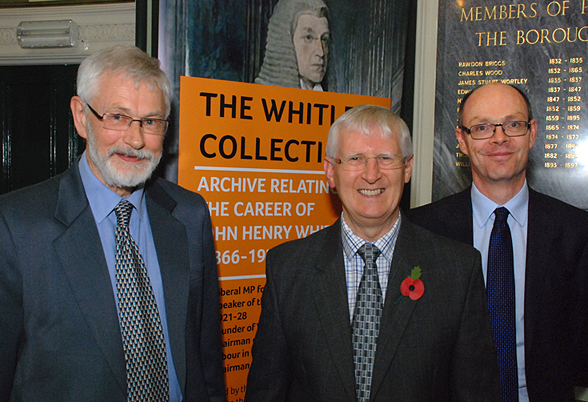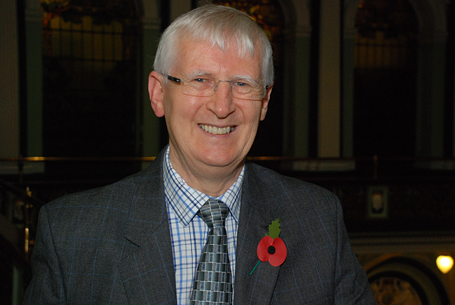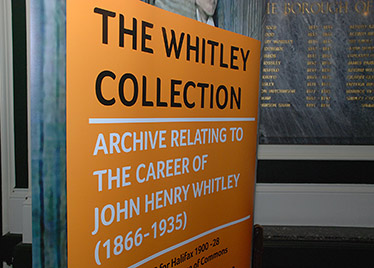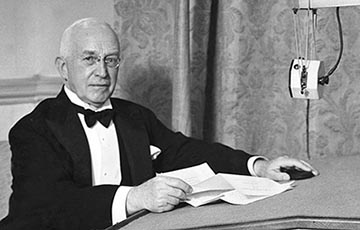J.H. Whitley – the MP’s Halifax roots shaped his politics
 Pictured above left to right: J.H. Whitley’s grandson John Whitley, historian John Hargreaves and the Dean from the School of Music, Humanities and Media Professor Martin Hewitt.
Pictured above left to right: J.H. Whitley’s grandson John Whitley, historian John Hargreaves and the Dean from the School of Music, Humanities and Media Professor Martin Hewitt.
Thu, 05 Nov 2015 16:26:00 GMT
“...his contemporaries recognised that his Halifax background was important in shaping his politics...”
 LEADING 20th century Parliamentarian John Henry Whitley made his mark nationally and internationally. But his politics and principles were firmly shaped by his upbringing, family inheritance, industrial experience and philanthropic activity in Halifax. This was the case made by historian Dr John Hargreaves (pictured left) when he delivered the latest lecture in an annual series that commemorates Whitley, a long-serving Liberal MP who was Speaker of the House of Commons during some of the most tumultuous years of the 1920s.
LEADING 20th century Parliamentarian John Henry Whitley made his mark nationally and internationally. But his politics and principles were firmly shaped by his upbringing, family inheritance, industrial experience and philanthropic activity in Halifax. This was the case made by historian Dr John Hargreaves (pictured left) when he delivered the latest lecture in an annual series that commemorates Whitley, a long-serving Liberal MP who was Speaker of the House of Commons during some of the most tumultuous years of the 1920s.
The lectures are organised by the History Department of the University of Huddersfield, which houses the J.H. Whitley Collection, an archive of papers, books, memorabilia and photographs deposited by the ex-Speaker’s descendants. Now a J.H. Whitley Prize and Bursary have been established, to encourage research in the archive, and in 2016 there will be a conference and book that will probe the life, times and legacy of the influential politician.
 The 2014 Whitley Lecture was given by current Commons Speaker John Bercow at Halifax’s medieval Minster. The 2015 edition was delivered by Dr Hargreaves at another historic location in the town – its splendidly-ornate Town Hall, opened in 1863 and designed by Sir Charles Barry, who had also been responsible for rebuilding the House of Commons.
The 2014 Whitley Lecture was given by current Commons Speaker John Bercow at Halifax’s medieval Minster. The 2015 edition was delivered by Dr Hargreaves at another historic location in the town – its splendidly-ornate Town Hall, opened in 1863 and designed by Sir Charles Barry, who had also been responsible for rebuilding the House of Commons.
This meant, as Dr Hargreaves pointed out, that J.H. Whitley’s political career took place against a backdrop of two classic buildings by Barry. The Town Hall has memorial plaques that include three generations of the Whitley family – John Henry himself, plus his father and his son – as former Mayors, Freemen and MP for the borough.
“J.H. Whitley gained some of his vocation and values in this town and in the committee rooms and debating chambers of this Town Hall, and in the debating chambers of the Palace of Westminster,” said Dr Hargreaves, who is a Research Fellow of the University of Huddersfield and author of the standard modern history of Halifax.
J.H. Whitley – a man with a mission
 J.H. Whitley (pictured left) was MP for Halifax between 1900 and 1928 and Speaker of the Commons from 1921-1928. Dr Hargreaves pointed out that he was the first Speaker from a Nonconformist background. He was also the first Speaker to have been engaged in manufacturing (his family ran a successful Halifax textile firm) and the first to have emerged from a background in municipal politics, as opposed to the landed gentry.
J.H. Whitley (pictured left) was MP for Halifax between 1900 and 1928 and Speaker of the Commons from 1921-1928. Dr Hargreaves pointed out that he was the first Speaker from a Nonconformist background. He was also the first Speaker to have been engaged in manufacturing (his family ran a successful Halifax textile firm) and the first to have emerged from a background in municipal politics, as opposed to the landed gentry.
When Whitley retired as Speaker, due to ill health, his views and upbringing meant that he declined a peerage, stating that he was “not a second chamber man”. His contemporaries recognised that his Halifax background was important in shaping his politics said Dr Hargreaves. The archives show that as an MP, Whitley had been a stern critic of the House of Lords.
He was closely involved in providing evening classes and sporting activities to young people from poor backgrounds in Halifax. A political threat to this might have been one of the factors that urged him to stand for election as an MP, argued Dr Hargreaves, whose lecture had material, including photographs, from the Whitley Collection that documented the popular and meticulously planned summer camps that J.H. Whitley organised for young Halifax people in Filey and Bridlington.
Another distinction of Whitley is that he is the only Speaker to have earned an “ism” after his name, said Dr Hargreaves. He was responsible for the creation of the industrial negotiating bodies known as Whitley Councils, and therefore a process termed “Whitleyism”. Dr Hargreaves argued that good industrial relations at the Whitley family business in Halifax were one of the formative influences on the future MP, who was always determined to ensure that municipal workers and Commons employees were paid fair wages.
 Dr Hargreaves’s wide-ranging lecture also included his research into J.H. Whitley’s parents Nathan and Sarah – who died after giving birth to her fifth child. He was from a Congregationalist background and she was raised a Methodist. Whitley’s political radicalism owed a great deal to this inheritance, and he was a firm opponent of an Education Act of 1902 that favoured the Church of England.
Dr Hargreaves’s wide-ranging lecture also included his research into J.H. Whitley’s parents Nathan and Sarah – who died after giving birth to her fifth child. He was from a Congregationalist background and she was raised a Methodist. Whitley’s political radicalism owed a great deal to this inheritance, and he was a firm opponent of an Education Act of 1902 that favoured the Church of England.
The audience was welcomed to the 2015 J.H. Whitley Lecture by the Mayor of Calderdale, Councillor Lisa Lambert, and Dr Hargreaves was introduced by Professor Martin Hewitt, who is the University of Huddersfield’s Dean of Music, Humanities and Media. There was also an address from J.H. Whitley’s grandson John Whitley, who played the key role in depositing the Whitley Archive at the University.
“We feel thoroughly vindicated in our decision to bring the archive to Huddersfield, so close to Halifax,” said Mr Whitley, who also praised Dr Hargreaves for his part in the process.
Also in attendance at the lecture were Mrs Helen Lee and Miss Una Marchetti, nieces of J.H. Whitley.
- The J.H. Whitley Prize and Bursary have been established to encourage research in the Whitley collection, at the University’s Heritage Quay archive centre. The prize has a value of £1,000, including travel and accommodation expenses to visit the archive and the 2016 conference on J.H. Whitley, plus £500 for the successful applicant. It is open to early-career scholars working on twentieth-century history who are able to incorporate the Whitley Collection into their current research. In addition, fund-raising – including contributions by the Whitley family – means that an annual bursary of between £500 and £1,000 can also be offered to students undertaking degrees at any university.







